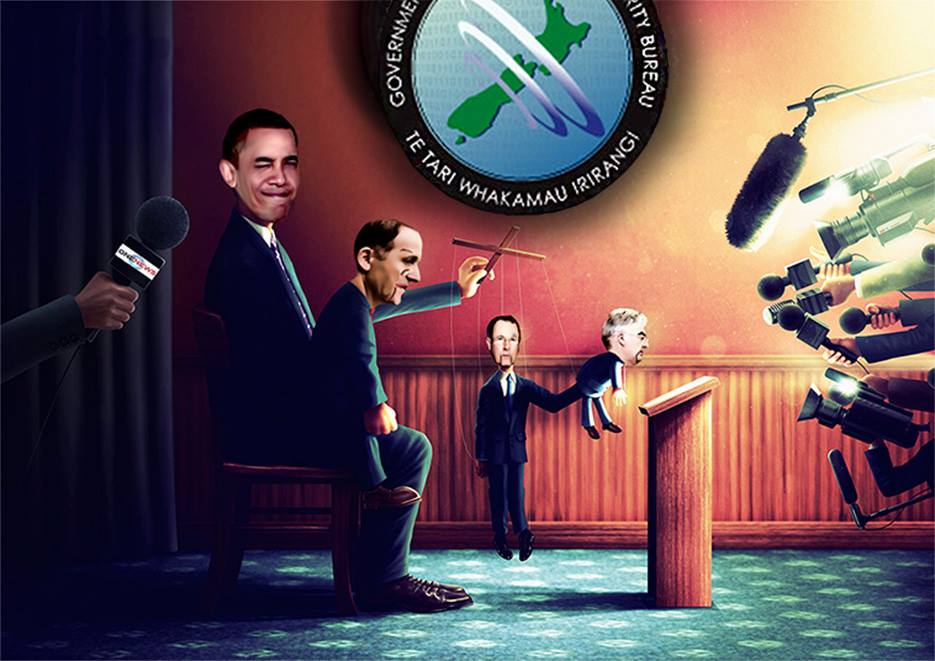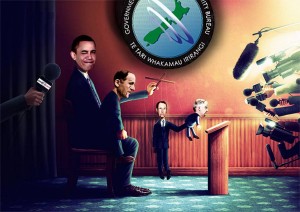Free speech is dangerous. That’s clearly the view of top security officials in Britain and New Zealand.
Firstly, to Britain. One Whitehall official, angry at the Guardian’s coverage of the Edward Snowden documents, told Guardian editor Alan Rusberger: “You’ve had your debate. There’s no need to write any more.” These chilling words accompanied a British government order that the Guardian destroy its computer hard drives containing the Snowden documents. The Guardian complied, but only because they had copies of the documents stored abroad.
The secret state might try to block public debate on intelligence matters, but surely the much-vaunted oversight bodies will protect our right to know? If you believe that it might pay to listen to the chair of Britain’s parliamentary Intelligence and Security Committee, Sir Malcolm Rifkind.
Interviewed by the BBC’s Today programme, Rifkind justified the destruction of the Guardian’s hard drives, arguing that whatever a newspaper editor might “genuinely think” there is an “inability to judge [intelligence material] if you are a newspaper editor or a journalist, as opposed to somebody involved in the intelligence work…” That is: only insiders are qualified to judge. Trust them, they know what they are doing. Let the watchers watch themselves.
Rifkind said the Heathrow airport detention of David Miranda (Guardian journalist Glenn Greenwald’s partner) was a “sensitive issue”. But holding him would be justified if Miranda was carrying some of Snowden’s material showing that US and UK intelligence had “much more sophisticated [access to communications] than perhaps were previously understood” because, according to Rifkind, making this public would help the “terrorists”. There was not the slightest recognition from Rifkind of the public’s right to know from Snowden that its phone calls and emails were now being comprehensively intercepted.
Here in New Zealand, there is also little recognition of the right of journalists to protect their sources when it comes to intelligence matters. The government has not accepted the principle that journalists should not have their phone records checked or their movements monitored, as happened to Fairfax journalist Andrea Vance.
At the very time the Key government is instituting state surveillance measures which further intrude on our privacy, it puts a wall of secrecy around virtually everything to do with the GCSB, in the hope of limiting debate, particularly about the GCSB’s relations with the American National Security Agency.
Last week, for example, John Key refused to answer a question from Green co-leader Russel Norman as to whether the GCSB receives “funding directly or indirectly from the Government of the United States” – a relevant question given Snowden’s information that the NSA is funding its British counterpart, the GCHQ. Key replied, without any explanation, that it was “not in the national interest” for him to answer that question. But since when was it in our “national interest” to hide what appears to be GCSB subservience to American intelligence?
Russel Norman continued his questioning by asking the PM whether it was a “basic principle of parliamentary responsibility for the government’s finances” for Parliament to know if “the GCSB receive(s) money from a foreign government.” Key’s reply: “I am not saying it is, or is not.” Well he should. There’s an old saying that “He who pays the piper, calls the tune.”
The “we won’t answer the question on national security grounds” was used repeatedly during my time in Parliament to stymie debate on intelligence issues. It largely worked for the government because even if journalists didn’t accept the “national security” excuse, they were often reluctant to continue covering a security issue if one side in the debate, the government, wouldn’t engage. Let’s hope the media adopt a more interrogatory stance now that public sensitivity to intelligence issues has been heightened by debate over the GCSB Bill – and the media itself is becoming an intelligence target.
Among the questions worthy of the attention by investigative journalists is whether the NSA still has a desk in the GCSB’s Wellington office, as it appeared to have a few years ago, according to evidence released by Wikileaks.







How wonderful it seemed as kids to learn about the virtues of democracy, but now how tragic is it to learn that our democracy is just a sham and the peoples rights are ignored.
It is the same like the fairytale stories told to little kids, like for instance about one “Father Christmas” coming to bring presents, is it not?
The real world tends to look much harsher if not grim a place to live in, and all kids go to realise it over time. That makes room for much distrust and cynicism. Others just do what so many do, put on pink glasses or blinkers, so the world looks the way they prefer it to look. Most do the latter, I feel and fear.
And now it’s just been revealed that NSA even spies on the United Nations. http://news.nationalpost.com/2013/08/25/u-s-spied-on-united-nations-by-hacking-into-video-conferencing-system-at-new-york-headquarters-report/
So much for the notion of the NSA being solely used to “fight terrorism”.
@Nitrium Or the UN is a hotbed of terrorism?
How could knowledge of the source of GCSB funding help ‘the terrorists’? More like not in the National government’s interests.
Not in either governments interests – Labour are as involved as any.
The greater the dirt and corruption, the greater the secrecy – power doesn’t like the sordid ways it does business to be known to those it profits off!
Yes let’s not let Labour off the hook, they introduced a raft of legislation during Clark’s time, that undermined people’s privacy, Minto wrote listing it all a while back.
Great article, I must say, thanks to Keith Locke! It adds nicely to Chris Trotter’s ‘Deep State’ one on The Daily Blog here.
Indeed, the powers behind the scene, the security agencies, they are like business lobbies exerting extremely much power on any government and potential government, basically all politicians that try to compete in elections and to get a seat in Parliament.
What happened with the Guardian being forced to destroy those files, that is the prime example of what we are facing, no matter where we live. So much for true freedom of expression, freedom to access information, freedom to shape an independent mind indeed!
Key can of course get away with refusing to answer to such questions, and that argument, that something cannot be made available or talked about, due to it involving matters that could compromise “national security”, and due to it therefore being in the “national interest” to not talk about it, will be used more often under the amended law ruling the GCSB and its activities.
Going further, business interests will naturally also be viewed as matters of “national interest”, that can then apply to oil drilling, mining, dairying, forestry, fishery and whatever else is important to New Zealand, as the country depends so much on exports of products extracted or made by those industries.
The media in New Zealand is already pretty useless, as it even does “self censor” itself, where editors are too mindful of the advertisers’ interests, as advertising is their bread and butter. They also often treat government official, politicians and senior government ministers with too much respect, as they do not want to bite the hand that feeds them with stories and interviews, in state broadcasting also with finance.
There are things the media should report on, but they do not, mostly they choose to not do so, because the editors in charge choose against reporting on certain sensitive stuff. Some have their political leanings also.
We have a situation where the media is basically “castrated”, if one can use that harsh and perhaps distasteful word, no matter how you look at it.
With all this goes true democracy, and that has been questioned and raised by me repeatedly, as I feel we do not have true democracy in this country anymore, well possibly never really had. It is a country and society run and controlled by those select few forces behind the scene, also by big business and those that fund certain agendas and drives, nothing else. Only once every 3 years the affected are told to cast the vote between the few options available, who are also tied into the larger agenda as part of “The Five Eyes”, dominated by the US.
Scary stuff this is, and those that dare stand up against it face severe persecution, and get shut down or told to shut up.
Hear hear good stuff.
yes indeed their trying to undermine the fact that they are exploiting not only the people but the code of ethics towards citizens and journalists allowing their professional duties to be influenced by our so call trust worthy democracy. Respect for truth and the public’s right to information are overriding principles of our government, promising a set of ethical standards and not delivering is not a way to win elections. There will obviously be a time when our democratic leaders exploit their freedom and power but we don’t live in a Liberal democracy. The fundamental principle is to respect the truth and the public’s right to information.
[…] Free media deemed a threat to national security By Keith Locke – See more at: https://thedailyblog.co.nz/2013/08/26/free-media-deemed-a-threat-to-national-security/#sthash.xkTwZ9o… […]
Yes indeed their trying to undermine the fact that they are exploiting not only the people but the code of ethics towards citizens and journalists allowing their professional duties to be influenced by our so call trust worthy democracy. Respect for truth and the public’s right to information are overriding principles of our government, promising a set of ethical standards and not delivering is not a way to win elections. There will obviously be a time when our democratic leaders exploit their freedom and power but we don’t live in a Liberal democracy. The fundamental principle is to respect the truth and the public’s right to information.
The government is shaping our perception, allowing the media to influence our knowledge on the safety reasons for the GCSB. The role of the media has increased when mediating between politicians and the public, giving the government opportunity to manufacture ways to undermine our attention by putting forward a media story to oversee what is really happening and manipulating the public by comparing other countries to New Zealand to which has a similar policy.
New Zealand is a democratic to which is ruled by coercion allowing the views of the citizens to be expressed, necessarily always voted on popularity, thus given the public a say on a policy. Why is this different? why now? Is there something your not telling us?
If children have the capability to hack into computers and websites and private information has a way of being leaked somehow, what will happen if the GCSB policy is authorized and it gets into the wrong hands. The media already has tactics and strategies to inform the public, all information should be a dialogue between citizens and government.
Bring in the fourth estate preventing abuse of power; I want my privacy, don’t you?
Comments are closed.